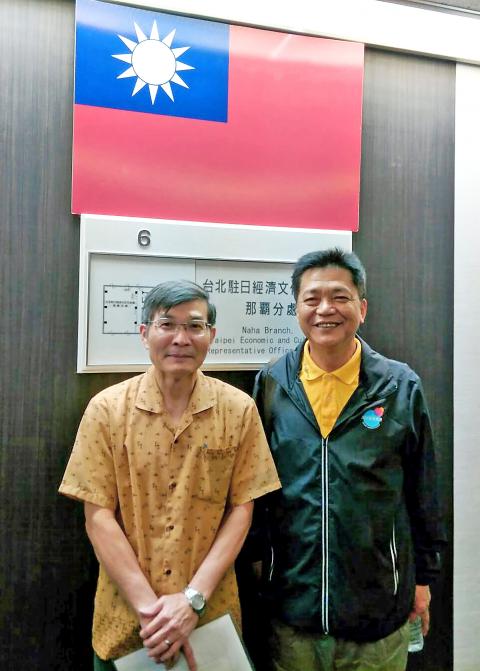Su Chii-cherng (蘇啟誠), director-general of the Osaka branch of the Taipei Economic and Cultural Office, committed suicide early yesterday at his residence, the Ministry of Foreign Affairs said, just one week after his office was accused of indifference to the plight of Taiwanese stranded in the area in the wake of Typhoon Jebi.
The ministry issued a statement expressing its deepest grief and regret over the loss of Su, 61, who assumed leadership of the office in July.
He previously served as director-general of the office’s Naha branch and as deputy secretary-general of what is now called the Taiwan-Japan Relations Association.

Photo: CNA
“Director Su was a hardworking and responsible diplomat. He had done a remarkable job during his diplomatic career and was always willing to mentor the nation’s younger diplomats,” the ministry said. “We are extremely saddened by his passing.”
The ministry said it would do everything it can to assist Su’s family and urged the public to respect their privacy.
Local media have reported that Su’s suicide was linked to work pressure, presumably caused by an outpouring of criticism due to the office’s perceived lack of assistance for Taiwanese who were affected by Jebi.
The ministry declined to comment on the allegations.
A netizen said they last week telephoned the Osaka office to ask whether it could help them find accommodation, to which a staff member allegedly responded: “How could I help you with that? Where you want to stay is your own choice.”
Criticism increased further after a false report emerged that the Chinese embassy in Japan sent tour buses to pick up Chinese tourists stuck in Osaka’s Kansai International Airport.
Minister of Foreign Affairs Joseph Wu (吳釗燮) on Wednesday said that changes are needed in the emergency response mechanism at the representative offices in Japan.
The heads of the offices were originally scheduled to meet in Osaka today to discuss ways to revise its emergency response protocols.
Representative to Japan Frank Hsieh (謝長廷) flew to Osaka after learning of Su’s suicide and issued a news release lamenting the diplomat’s death.
“People have been comparing what the Osaka office did to help tourists stranded in Kansai International Airport with what the Chinese embassy did, placing staff at the office under tremendous pressure,” Hsieh said.
Staff at the offices did their utmost to help in the wake of Jebi and a magnitude 6.6 earthquake that struck Hokkaido on Thursday last week, Hsieh said, adding that their hard work should be justly recognized.
The Presidential Office said that President Tsai Ing-wen (蔡英文) has instructed the ministry to do everything possible to assist Su’s family, and expressed sorrow and condolences over the diplomat’s death.
Additional reporting by Lin Tsuei-yi and CNA

FALSE DOCUMENTS? Actor William Liao said he was ‘voluntarily cooperating’ with police after a suspect was accused of helping to produce false medical certificates Police yesterday questioned at least six entertainers amid allegations of evasion of compulsory military service, with Lee Chuan (李銓), a member of boy band Choc7 (超克7), and actor Daniel Chen (陳大天) among those summoned. The New Taipei City District Prosecutors’ Office in January launched an investigation into a group that was allegedly helping men dodge compulsory military service using falsified medical documents. Actor Darren Wang (王大陸) has been accused of being one of the group’s clients. As the investigation expanded, investigators at New Taipei City’s Yonghe Precinct said that other entertainers commissioned the group to obtain false documents. The main suspect, a man surnamed

DEMOGRAPHICS: Robotics is the most promising answer to looming labor woes, the long-term care system and national contingency response, an official said Taiwan is to launch a five-year plan to boost the robotics industry in a bid to address labor shortages stemming from a declining and aging population, the Executive Yuan said yesterday. The government approved the initiative, dubbed the Smart Robotics Industry Promotion Plan, via executive order, senior officials told a post-Cabinet meeting news conference in Taipei. Taiwan’s population decline would strain the economy and the nation’s ability to care for vulnerable and elderly people, said Peter Hong (洪樂文), who heads the National Science and Technology Council’s (NSTC) Department of Engineering and Technologies. Projections show that the proportion of Taiwanese 65 or older would

Democracies must remain united in the face of a shifting geopolitical landscape, former president Tsai Ing-wen (蔡英文) told the Copenhagen Democracy Summit on Tuesday, while emphasizing the importance of Taiwan’s security to the world. “Taiwan’s security is essential to regional stability and to defending democratic values amid mounting authoritarianism,” Tsai said at the annual forum in the Danish capital. Noting a “new geopolitical landscape” in which global trade and security face “uncertainty and unpredictability,” Tsai said that democracies must remain united and be more committed to building up resilience together in the face of challenges. Resilience “allows us to absorb shocks, adapt under

Taiwan Semiconductor Manufacturing Co (TSMC, 台積電) yesterday said it is building nine new advanced wafer manufacturing and packaging factories this year, accelerating its expansion amid strong demand for high-performance computing (HPC) and artificial intelligence (AI) applications. The chipmaker built on average five factories per year from 2021 to last year and three from 2017 to 2020, TSMC vice president of advanced technology and mask engineering T.S. Chang (張宗生) said at the company’s annual technology symposium in Hsinchu City. “We are quickening our pace even faster in 2025. We plan to build nine new factories, including eight wafer fabrication plants and one advanced